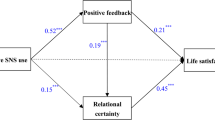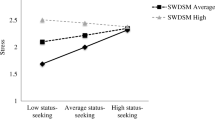Abstract
There are various interpersonal interaction modalities in this current digital age, such as social media networks. The literature on the effects of social media on health and well-being indicators is saturated with studies that primarily focus on the frequency of social media use or amount of time spent on social media, neither of which captures the quality of social interactions. To address this gap in the literature, the present study aimed to (a) measure satisfaction with social interactions—for both social media and in-person interactions—and examine its links to indices of mental health (distress, anxiety, depression, anger, and loneliness), and (b) test one’s sense of social connectedness as the mediator in the relation between satisfaction with social interactions and psychological well-being. Data were collected through a web-based survey that was administered to 2,782 incoming undergraduate students. The results showed that, after controlling for gender and race, both satisfaction with social interactions through social media and with in-person interactions were significantly and inversely related to self-reports of distress, anxiety, depression, anger, and loneliness. In addition, the findings from robust mediation tests indicated that social connectedness mediated the path between satisfaction with social interactions and the indices of well-being, and the indirect effects were all significant. The study contributed to our understanding of how satisfaction with interpersonal interactions—digitally or in-person—can impact psychological well-being directly and indirectly, with important implications for students, educators, and practitioners.


Similar content being viewed by others
Data availability
The datasets generated during and/or analyzed during the current study are not publicly available due to confidentiality and privacy reasons set forth by the Institutional Review Board.
References
Alfons, A., Ateş, N. Y., & Groenen, P. J. F. (2022a). A robust bootstrap test for mediation analysis. Organizational Research Methods, 25(3), 591–617. https://doi.org/10.1177/1094428121999096
Alfons, A., Ateş, N. Y., & Groenen, P. J. F. (2022b). Robust Mediation Analysis: The R Package robmed. Journal of Statistical Software, 103(13), 1–45. https://doi.org/10.18637/jss.v103.i13
American Customer Satisfaction Index. (2022). At a glance: Social media. https://www.theacsi.org/industries/e-business/social-media/. Accessed 20 Jan 2023
Bargh, J. A., McKenna, K. Y. A., & Fitzsimons, G. M. (2002). Can you see the real me? Activation and expression of the “true self” on the internet. Journal of Social Issues, 58(1), 33–48. https://doi.org/10.1111/1540-4560.00247
Barry, C., Sidoti, C., Briggs, S., Reiter, S., & Lindsey, R. (2017). Adolescent social media use and mental health from adolescent and parent perspectives. Journal of Adolescence, 61, 1–11. https://doi.org/10.1016/j.adolescence.2017.08.005
Baumeister, R. F., & Hutton, D.G. (1987). Self-presentation theory: Self-construction and audience pleasing. In B. Mullen, & G. R. Goethals (Eds.), Theories of group behavior (pp. 71–87). Springer. https://doi.org/10.1007/978-1-4612-4634-3_4
Baym, N. K., Wagman, K. B., & Persaud, C. J. (2020). Mindfully scrolling: Rethinking Facebook after time deactivated. Social Media + Society, 6(2), 1–10. https://doi.org/10.1177/2056305120919105
Berkman, L. F., & Syme, L. S. (2017). Social networks, host resistance, and mortality: A nine-year follow-up study of Alameda county residents. American Journal of Epidemiology, 185(11), 1070–1088. https://doi.org/10.1093/aje/kwx103 (Reprinted from “Social networks, host resistance, and mortality: A nine-year follow-up study of Alameda county residents,” 1979, American Journal of Epidemiology, 109[2], 186–204, https://doi.org/10.1093/oxfordjournals.aje.a112674)
Brignall, T. W., & Van Valey, T. (2005). The impact of internet communications on social interaction. Sociological Spectrum, 25(3), 335–348. https://doi.org/10.1080/02732170590925882
Chayko, M. (2002). Connecting: How we form social bonds and communities in the internet age. State University of New York Press.
Chayko, Mary. (2008). Portable communities: The social dynamics of online and mobile connectedness. State University of New York Press.
Clark, J., Algoe, S., & Green, M. (2018). Social network sites and well-being: The role of social connection. Current Directions in Psychological Science, 27(1), 32–37. https://doi.org/10.1177/0963721417730833
Coleman, J. S. (1988). Social capital in the creation of human capital. American Journal of Sociology, 94(Supplement), S95–S120. https://doi.org/10.1086/228943
Eaton, N. R., Keyes, K. M., Krueger, R. F., Balsis, S., Skodol, A. E., Markon, K. E., Grant, B. F., & Hasin, D. S. (2012). An invariant dimensional liability model of gender differences in mental disorder prevalence: Evidence from a national sample. Journal of Abnormal Psychology, 121(1), 282–288. https://doi.org/10.1037/a0024780
Ellison, N., Steinfield, C., & Lampe, C. (2007). The benefits of Facebook “friends:” Social capital and college students’ use of online social network sites. Journal of Computer-Mediated Communication, 12(4), 1143–1168. https://doi.org/10.1111/j.1083-6101.2007.00367.x
Ellison, N., Steinfield, C., & Lampe, C. (2011). Connection strategies: Social capital implications of Facebook-enabled communication practices. New Media & Society, 13(6), 873–892. https://doi.org/10.1177/1461444810385389
Eisenberg, D., Hunt, J., & Speer, N. (2013). Mental health in American colleges and universities: Variation across student subgroups and across campuses. The Journal of Nervous and Mental Disease, 201(1), 60–67. https://doi.org/10.1097/NMD.0b013e31827ab077
Everson-Rose, S., & Lewis, T. (2005). Psychosocial factors and cardiovascular diseases. Annual Review of Public Health, 26(1), 469–500. https://doi.org/10.1146/annurev.publhealth.26.021304.144542
Granovetter, M. (1973). The strength of weak ties. American Journal of Sociology, 78(6), 1360–1380. https://doi.org/10.1086/225469
Hawkley, L. C., Duvoisin, R., Ackva, J., Murdoch, J. C., & Luhmann, M. (2016). Loneliness in older adults in the USA and Germany: Measurement invariance and validation. NORC at the University of Chicago. https://www.norc.org/PDFs/Working%20Paper%20Series/WP-2015-004.pdf
Helliwell, J., & Putnam, R. (2004). The social context of well-being. Philosophical Transactions of the Royal Society of London: Biological Sciences, 359(1449), 1435–1446. https://doi.org/10.1098/rstb.2004.1522
Hou, Y., Xiong, D., Jiang, T., Song, L., & Wang, Q. (2019). Social media addiction: Its impact, mediation, and intervention. Cyberpsychology: Journal of Psychosocial Research on Cyberspace, 13(1). https://doi.org/10.5817/CP2019-1-4
Hughes, M., Waite, L., Hawkley, L., & Cacioppo, J. (2004). A short scale for measuring loneliness in large surveys: Results from two population-based studies. Research on Aging, 26(6), 655–672. https://doi.org/10.1177/0164027504268574
Kenny, D. (2021, May 4). Mediation. https://davidakenny.net/cm/mediate.htm#IE. Accessed 10 May 2023
Keum, B. T., Wang, Y.-W., Callaway, J., Abebe, I., Cruz, T., & O’Connor, S. (2022). Benefits and harms of social media use: A latent profile analysis of emerging adults. Current Psychology. https://doi.org/10.1007/s12144-022-03473-5
Kim, B., & Kim, Y. (2017). College students’ social media use and communication network heterogeneity: Implications for social capital and subjective well-being. Computers in Human Behavior, 73, 620–628. https://doi.org/10.1016/j.chb.2017.03.033
Lee, K., Choi, J., Kim, C., & Kim, Y. (2014). Social media, network heterogeneity, and opinion polarization. Journal of Communication, 64(4), 702–722. https://doi.org/10.1111/jcom.12077
Lee, R., Dean, B., & Jung, K. (2008). Social connectedness, extraversion, and subjective well-being: Testing a mediation model. Personality and Individual Differences, 45(5), 414–419. https://doi.org/10.1016/j.paid.2008.05.017
Lee, R., & Robbins, S. (1995). Measuring belongingness: The social connectedness and the social assurance scales. Journal of Counseling Psychology, 42(2), 232–241. https://doi.org/10.1037/0022-0167.42.2.232
Lee, R. M., & Robbins, S. B. (1998). The relationship between social connectedness and anxiety, self-esteem, and social identity [Editorial]. Journal of Counseling Psychology, 45(3), 338–345. https://doi.org/10.1037/0022-0167.45.3.338
Lee, R. M., & Robbins, S. B. (2000). Understanding social connectedness in college women and men. Journal of Counseling & Development, 78(4), 484–491. https://doi.org/10.1002/j.1556-6676.2000.tb01932.x
Lincoln, K. D. (2000). Social support, negative social interactions, and psychological well-being. The Social Service Review, 74(2), 231–252. https://doi.org/10.1086/514478
Mitchell, A., Baker-Glenn, E., Granger, L., & Symonds, P. (2010). Can the distress thermometer be improved by additional mood domains? Part I. Initial validation of the emotion thermometers tool. Psycho-Oncology, 19(2), 125–33. https://doi.org/10.1002/pon.1523
Murthy, V. H. (2020). Together: The healing power of human connection in a sometimes lonely world. HarperCollins.
Nabi, R., Prestin, A., & So, J. (2013). Facebook friends with (health) benefits? Exploring social network site use and perceptions of social support, stress, and well-being. Cyberpsychology, Behavior and Social Networking, 16(10), 721–727. https://doi.org/10.1089/cyber.2012.0521
Pew Research Center. (2021, April 7). Social media fact sheet. https://www.pewresearch.org/internet/fact-sheet/social-media/. Accessed 20 Jan 2023
Rafla, M., Carson, N. J., & DeJong, S. M. (2014). Adolescents and the internet: What mental health clinicians need to know. Current Psychiatry Reports, 16(9), 472. https://doi.org/10.1007/s11920-014-0472-x
Russell, D., Peplau, L. A., & Cutrona, C. E. (1980). The revised UCLA loneliness scale: Concurrent and discriminant validity evidence. Journal of Personality and Social Psychology, 39(3), 472–480. https://doi.org/10.1037/0022-3514.39.3.472
Skałacka, K., & Pajestka, G. (2021). Digital or in-person: The relationship between mode of interpersonal communication during the COVID-19 pandemic and mental health in older adults from 27 countries. Journal of Family Nursing, 27(4), 275–284. https://doi.org/10.1177/10748407211031980
Tanis, M., & Postmes, T. (2003). Social Cues and Impression Formation in Computer Mediated Communications. Journal of Communication, 52(4), 676–693. https://doi.org/10.1111/j.1460-2466.2003.tb02917.x
Teo, A. R., Choi, H., Andrea, S. B., Valenstein, M., Newsom, J. T., Dobscha, S. K., & Zivin, K. (2015). Does mode of contact with different types of social relationships predict depression in older adults? Evidence from a nationally representative survey. Journal of the American Geriatrics Society, 63(10), 2014–2022. https://doi.org/10.1111/jgs.13667
Tifferet, S., & Vilnai-Yavetz, I. (2014). Gender differences in Facebook self-presentation: An international randomized study. Computers in Human Behavior, 35, 388–399. https://doi.org/10.1016/j.chb.2014.03.016
Umberson, D., & Montez, J. K. (2010). Social relationships and health: A flashpoint for health policy. Journal of Health and Social Behavior, 51(1 Suppl), S54–S66. https://doi.org/10.1177/0022146510383501
Wellman, B., Haase, A., Witte, J., & Hampton, K. (2001). Does the internet increase, decrease, or supplement social capital? Social networks, participation, and community commitment. American Behavioral Scientist, 45(3), 436–455. https://doi.org/10.1177/00027640121957286
Williams, K. L., & Galliher, R. V. (2006). Predicting depression and self-esteem from social connectedness, support, and competence. Journal of Social and Clinical Psychology, 25(8), 855–874. https://doi.org/10.1521/jscp.2006.25.8.855
Williams, D. R., Yu, Y., & Jackson, J. S. (1997). Racial differences in physical and mental health: Socio-economic status, stress and discrimination. Journal of Health Psychology, 2(3), 335–351. https://doi.org/10.1177/135910539700200305
Author information
Authors and Affiliations
Corresponding author
Ethics declarations
Conflict of interest
On behalf of all authors, the corresponding author states that there is no conflict of interest.
Ethics approval
The study received Institutional Review Board approval from home institution (#316599–15).
Informed consent to participate
All participants were provided informed consent and consented to participate in the study.
Consent for publication
All participants were provided informed consent that data will be used for publication.
The authors have no financial or non-financial interests to disclose relevant to this manuscript.
Additional information
Publisher's note
Springer Nature remains neutral with regard to jurisdictional claims in published maps and institutional affiliations.
Rights and permissions
Springer Nature or its licensor (e.g. a society or other partner) holds exclusive rights to this article under a publishing agreement with the author(s) or other rightsholder(s); author self-archiving of the accepted manuscript version of this article is solely governed by the terms of such publishing agreement and applicable law.
About this article
Cite this article
Abebe, I., Wang, YW., O’Connor, S. et al. Satisfaction with online/in-person social interactions and psychological well-being: The mediating role of social connectedness. Curr Psychol 43, 8678–8687 (2024). https://doi.org/10.1007/s12144-023-04870-0
Accepted:
Published:
Issue Date:
DOI: https://doi.org/10.1007/s12144-023-04870-0




